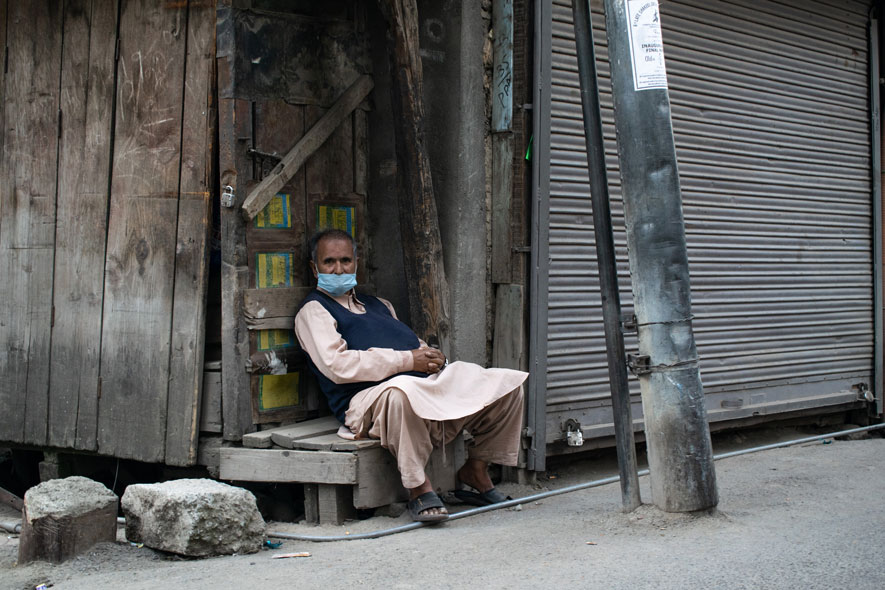Kashmir Businesses Grapple With New Spending Habits Post Pandemic

Basit Parray is a trainee staff writer at the Mountain…
Shopkeepers urge people to shop locally to help keep Kashmir businesses afloat.
Srinagar — As the business establishments in Kashmir valley struggle to stay afloat due to three years of the crisis caused by political upheaval and pandemic, the traders in the region are grappling with evolution in spending habits of people, something they find hard to deal with.
In the first quarter of the year 2020, business establishments in Kashmir were picking up pace. The markets witnessed decent footfall, after a difficult year, as the Government of India had imposed a lockdown in the region for several months after the abrogation of J&K’s ‘special status’ on August 5, 2019.
Amidst the hustle and bustle in the markets, which had returned months after the 2019 decision, the Government of India imposed another severe lockdown in March 2020—this time to curb the growing coronavirus pandemic throwing the Kashmir business community into a ‘never-ending’ crisis. The back-to-back lockdowns forced the businesses across Jammu and Kashmir to shut down again for months.
As the curve flattened, shop owners and traders expected a spike in the footfall, but by now, people were shopping online.
“We don’t know how to feed our families and keep our businesses afloat,” Masoom Ahmad, a shopkeeper in Lalchowk said.
Support Our Journalism
You are reading this because you value quality and serious journalism.
But, serious journalism needs serious support. We need readers like you to support us and pay for making quality and independent journalism more vibrant.
The shopkeepers in the city centre Lalchowk said that the locals should prefer shopping locally rather than shopping online. “I appeal to people to shop locally as much as possible because that will support our businesses and our families.” The businessmen said they are in an extreme situation. “Nobody understands the cost we have paid in the last two years.”

The newly elected president of The Kashmir Chamber of Commerce and Industry (KCCI), Sheikh Ashiq said that the economy had started to pick up in the first few months of 2020. Jobs started to hark back, consumer confidence was high and people started spending money again. This was a positive moment, raising hopes.
People wanted to get out and be in the world again, but coronavirus turned the world upside down. Every state in mainland India asked the businesses to shut down and residents to stay home. “Customers were freaked out and we saw nothing on roads. No traffic. No people. Everything became dark and soon we realized that the situation will hurt our businesses even more,” Masoom said.
The pandemic has put small businesses to the test—from salons to groceries to restaurants. They’re all facing an existential threat. “Every day, I wake up and keep my fingers crossed that this will end. I don’t know what the future holds for us. I don’t really want to think about it,” Aadil, a local vendor said.
Restaurants are out of staff and have suffered huge losses. Even after they opened, people did not return. Restaurants don’t have money to pay salaries to their staff. So, it’s just all are falling for any sector, be it transport or restaurants. “It’ll be years before we fully understand the economic impact of the coronavirus,” Ashiq continued.
He said the business is down by 75 to 80 per cent. Most of the business establishments have laid off more than half of their staff. Changes in spending habits are one of the most immediate effects of the pandemic.
“Our economy worked only at 20 per cent. As a result, economy worth Rs. 50,000 crores fell from 5 August 2019 to 5 August 2021,” Ashiq laments. The first to hit by this crisis were the employees. “Whenever we face a lockdown, more than 5 lakh private employees go jobless.”
KCCI had suggested the government to find a solution of the situation faced by daily wagers due to ongoing lockdowns.
Ashiq said that for the last 30 years Kashmiris are struggling economically due to the unrest, but things have worsened with the pandemic.

He suggested that Kashmiris should not wait for outsiders to bail them out of the current situation or allow them to take advantage of our money. “Kashmiri youth should be self-enterprising.”
“If we don’t get any kind of bailout, it’s going to be a long time for us to get our feet in again. Because, who knows how long this is going to go on. It can go on for months. And we can’t operate like that.”
Mountain Ink is now on Telegram. Subscribe here.
Become Our Ally
To help us strengthen the tradition of quality reading and writing, we need allies like YOU. Subscribe to us.
Basit Parray is a trainee staff writer at the Mountain Ink. He is a bachelor's student of Journalism & Mass Communication at the Cluster University, Srinagar.








